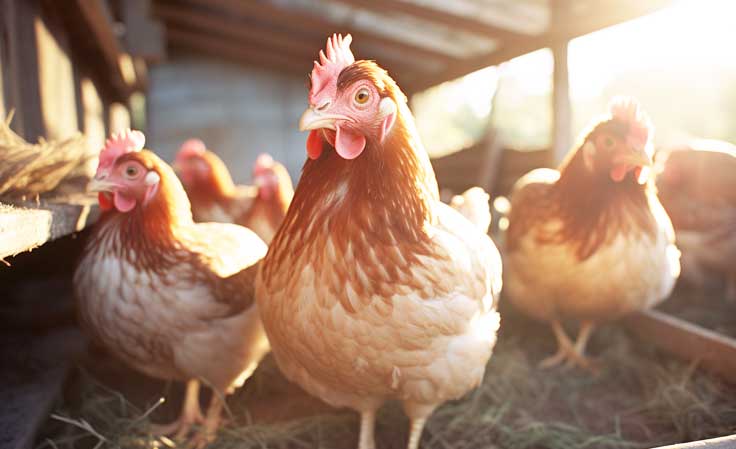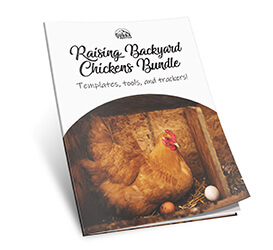Raising chickens can be a rewarding and enjoyable experience, but ensuring the happiness and well-being of your feathered friends is essential. Happy chickens are not only more productive but also lead healthier lives. I feel a personal responsibility for life that I bring onto the homestead, so I always try to bring joy however I can to my homestead animals. Chickens are more than just egg producers, they are a valuable part of your homestead through pest control and compost creation. In this blog, we'll explore key strategies and practices to help you have happier chickens in your backyard or coop.
1. Provide Adequate Space
Chickens need space to roam, scratch, and forage. Overcrowded conditions can lead to stress, aggression, and disease among your flock. Ensure that each chicken has at least 2-3 square feet of coop space and 8-10 square feet of outdoor space to roam freely.
Space makes a difference for your chickens. I can tell the happiness difference when my chickens are able to be out and about free-ranging by themselves or with the flock—they are lively. When they are cooped inside of the coop, they start to get on each other’s nerves, similar to us when we are cooped inside all day
2. Build a Secure Coop
A safe and predator-proof coop is crucial for the well-being of your chickens. Ensure that the coop is well-ventilated, has proper nesting boxes, and provides protection from extreme weather conditions. Regularly inspect and maintain the coop to prevent drafts, leaks, and weak spots that predators might exploit.
You don’t want your chickens to have to stress about predators creeping about the coop. Build them a safe environment, so they feel comfortable to lay eggs and peck about.
3. Offer Fresh Water
Clean, fresh water is essential for your chickens' health. Make sure they have access to clean water at all times. During winter, use heated waterers to prevent freezing. In hot weather, provide shade and ensure that water containers are shaded to keep the water cool.
If you live somewhere where water will freeze, you can also keep a plastic water bottle floating about the water trough to slow down ice formation. Even in winter, your chickens will need fresh water daily.
4. Provide Nutritious Food
A balanced diet is essential for your chickens' happiness and productivity. Choose a high-quality chicken feed appropriate for their age and purpose (e.g., layer feed for egg-laying hens). Supplement their diet with kitchen scraps, vegetables, and occasional treats like mealworms, but avoid feeding them spoiled or moldy food.
Your chickens will love to help you eat appropriate chicken scraps—even your leftover meat! They will turn what you give them into gold (nutrient dense eggs.)
5. Allow for Natural Foraging
Chickens love to forage for insects, worms, and plants. Encourage their natural behavior by allowing them access to outdoor areas with grass and soil. Rotating their outdoor space or using chicken tractors can help prevent overgrazing and maintain a healthier environment.
Encouraging a natural environment as much as possible will drastically increase the happiness of your chickens. Don’t keep your chickens cooped up and away from the outdoors, if possible.
6. Dust Bathing Areas
Chickens enjoy dust bathing to clean their feathers and skin, as well as to deter mites and parasites. Provide a designated dust bathing area in your coop or yard by mixing sand, soil, and wood ash. This will help keep your chickens clean and content.
It is fun to watch them scratch into the dirt and scoop it onto their wings to bathe themselves.
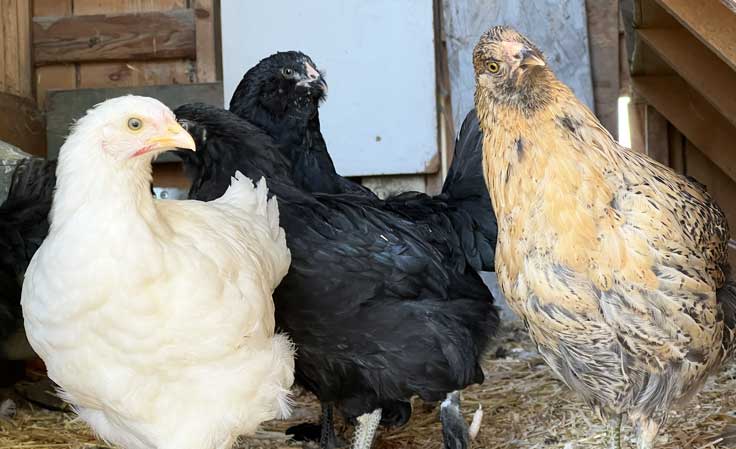
7. Promote Social Interaction
Chickens are social animals that thrive on interaction with their flock. Keep a small group of chickens together to prevent loneliness and stress. Roosters can also provide companionship and protection, but ensure that they don't become overly aggressive.
An overly aggressive rooster can quickly become chicken dinner. I have no tolerance for aggressive roosters as I have other animals and children that I don’t want to become a target of rooster aggression. It is good to keep a group of chickens, a minimum of two, so they have a friend.
8. Secure Nighttime Safety
Chickens are vulnerable to nighttime predators, so it's crucial to secure them safely in the coop after dark. Ensure that all chickens are inside the coop well before sunset, and lock the coop securely. Chickens have an internal clock and sense that will tell them when they need to start making it back to the coop to roost. If you have trees around your chicken run, you may find chickens like to roost in the branches.
9. Nesting Boxes
Provide comfortable and private nesting boxes for your hens to lay eggs. Use straw or wood shavings as bedding material. Clean the nesting boxes regularly to maintain a hygienic environment.
I love to use chicken nesting box pads and just replace them when they get dirty. This makes maintaining the chicken coop less of a hassle.
10. Regular Health Checks
Monitor the health of your chickens regularly. Check for signs of illness, injury, or parasites. Handle different chicken ailments however you feel comfortable. Consult with your homestead and farm veterinarian.
11. Entertainment and Enrichment
Chickens are intelligent and can get bored. Provide entertainment and enrichment by hanging treats, mirrors, or even a swing in the coop. These activities can reduce stress and enhance their quality of life. Chickens like to explore, so you can set up different obstacles like tires or ladders that they can hop about on.
12. Maintain a Clean Environment
Regularly clean the coop and outdoor areas to prevent the buildup of waste and disease. Proper sanitation is essential for the health and happiness of your chickens. I use the deep-litter method, so I am continuously stacking chicken bedding (wood shavings) on top of the old. I like this method as it is low maintenance, but it keeps the area clean.
13. Avoid Overbreeding
Overbreeding can lead to genetic health issues and stress among chickens. Be mindful of breeding practices, and ensure that you're not breeding chickens too frequently or with close relatives. Sometimes, this can be hard to manage on a homestead with the same family in the coop, but just keep this in mind if you are relying on broody hens to hatch and raise chicks for your flock.
14. Respect Their Natural Behavior
Understanding and respecting the natural behaviors of chickens is key to their happiness. Let them scratch, peck, and explore their environment. Avoid unnecessary disruptions and stress. Again, this goes back to allowing them to enjoy a natural environment.
15. Be Gentle and Calm
When handling your chickens, be gentle and calm to avoid frightening them. Over time, they will become more accustomed to your presence and may even become friendlier. You can get them used to you by bribing them with chicken treats. They will love to come if you have treats in hand!
16. Consider treat training
One of my favorite things with my chickens is when I yell “chick chick chick-y,” they come running. This is because when they were chicks, I would say this phrase then reward them with treats or scratch. This encourages them to become accustomed to my voice and come when called.
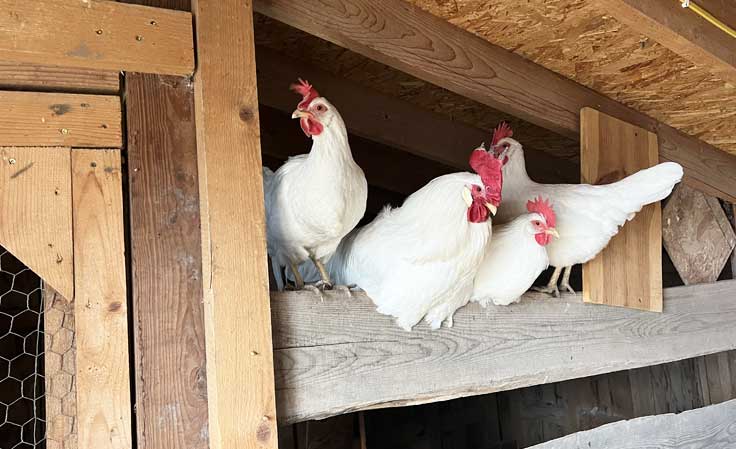
17. Protection from Harsh Weather
Extreme weather conditions can stress chickens. Provide protection from both hot and cold weather. During the summer, ensure they have access to shade and fresh, cool water. In the winter, use insulation or heated waterers to keep them warm and comfortable. I would not suggest the use of heat lamps as they pose too much of a fire hazard.
18. Grooming and Health Checks
Regular grooming and health checks are essential for maintaining your chickens' well-being. Check their feathers for signs of mites or lice, trim overgrown nails, and inspect their eyes and beaks. Grooming not only keeps them clean but also helps prevent health issues. Just keeping an eye on them daily will alert you to any health adversities your chickens are facing.
19. Maintain a Daily Routine
Chickens thrive on routine. Try to maintain a consistent daily schedule for feeding, collecting eggs, and letting them out to forage. Predictability can reduce stress and make your chickens feel secure.
20. Consider a Roosting Area
Chickens naturally prefer to roost at night. Provide sturdy roosting bars or branches in the coop, where they can sleep comfortably. Make sure there's enough space for all your chickens to roost without crowding. This is where they establish a pecking order and you may witness some bullying on the roost, this is natural and okay.
21. Address Behavioral Issues
Sometimes, chickens may display behavioral issues like aggression or feather pecking. Address these issues promptly to maintain a harmonious flock. Isolate aggressive birds if necessary and provide distractions to deter negative behavior. I don’t want aggressive birds in my flock, so they are dealt with immediately.
22. Choose Chicken-Friendly Plants
If you allow your chickens to roam in a garden or yard, consider planting chicken-friendly vegetation. Certain plants, like clover, comfrey, or marigolds, can provide food and shade while also attracting insects for your chickens to forage. Keep in mind, your chickens will scratch and dig up your garden plants, so allow them to roam in areas you don’t mind plants to be dug up.
23. Treat Them with Respect and Kindness
Building a bond of trust with your chickens is essential. Treat them with respect and kindness, and avoid sudden movements or loud noises that might startle them. Over time, they will become more comfortable with your presence. Training them from young chicks is essential for trust.
24. Gradual Introductions
If you introduce new chickens to your flock, do so gradually. Isolate the newcomers in a separate pen within sight of the existing flock for a few weeks before allowing them to mix. This helps reduce aggression and stress during integration. Bigger birds may pick on the smaller ones.
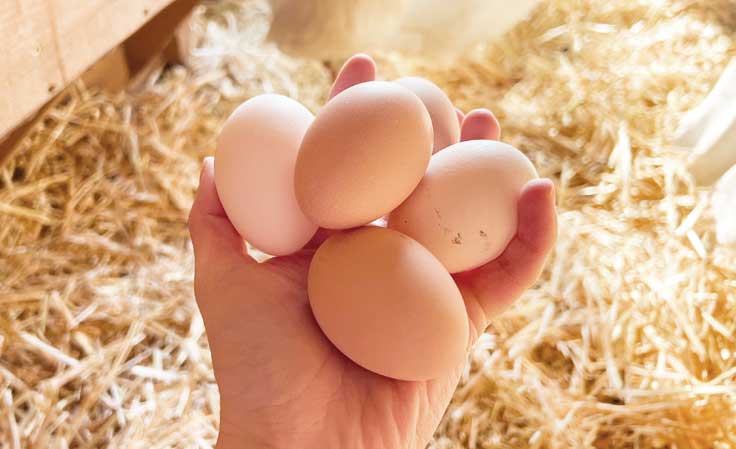
25. Consider Their Age and Needs
Remember that the needs of chickens change with age. Chicks require special care and a brooder, while older hens may need specific supplements or accommodations. Adjust your care practices to suit the life stage of your flock.
By implementing these additional tips and practices, you can further enhance the happiness and well-being of your chickens. A content and healthy flock not only rewards you with fresh eggs and companionship but also enriches your backyard or coop environment with their cheerful presence. Collecting eggs is one of the more joyful and peaceful parts of my day. Enjoy the delightful experience of raising happy chickens and the many benefits they bring to your life.

